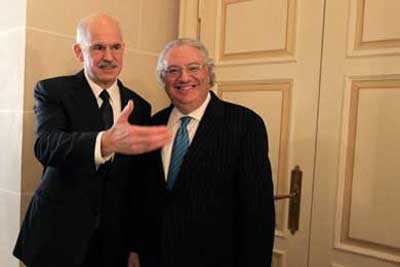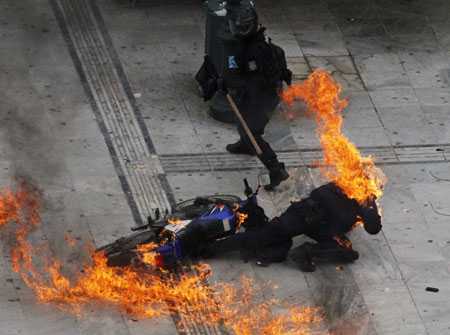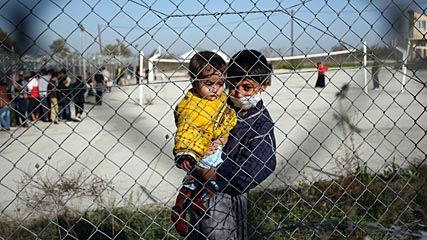by James Petras*
New York (United States)
In the midst of the Arab uprisings throughout the Middle East, at a time when even the European (EU) has publicly condemned Israel’s blockade of Gaza and its illegal land seizures in the West Bank and East Jerusalem, Greek Prime Minister George Papandreou promised a visiting delegation of U.S. Jewish leaders, his full support to undermine EU opposition and promote Israeli economic, diplomatic and political interests in Europe.

U.S. Zionists, recently returned from a visit to Athens described Papandreou as by far the most amenable (‘servile’) European leader they have met in recent memory. Papandreou’s slavish submission to Israeli interests includes his promise, to a delegation of U.S. zionist notables, to use his influence to pressure the new Egyptian military junta to continue to uphold the Mubarak agreements with Israel [1]. These include the continued blockade of Gaza and support of Israel’s military assaults on Lebanon, Syria and Palestinians. In other words Papandreou is openly supportive of Egypt’s past collaboration with Israeli clandestine assassinations and kidnapping of Arab militants.
Papandreou demonstrates a greater interest in promoting Israel’s exports to the European market, than the country he ostensibly represents. He promised a delegation from the Conference of Presidents of Major American Jewish Organizations “to integrate Israel into the European market” [2] while he shrinks the Greeks economy by 10% between 2009-11 and doubles unemployment from 8% to 16%. Papandreou’s gross servility to Israel and the American Zionist power structure is manifested in his cordial reception and recent agreements with Israel’s Prime Minister Netanyahu and his foreign minister, the notorious Zionist-fascist Avigdor Lieberman – the same Lieberman who advocates wholesale expulsion of Palestinians from the West Bank. No Greek Prime Minister, since the Zionist state was founded, has exhibited such a bizarre display of active collaboration with Israel’s colonial claims in the Middle East. No European leader has so eagerly anticipated and implemented the demands of American Zionist organizations with such zeal.
What is most striking about Papandreou’s servility to Israeli and American Zionist interests, is that it takes place when most of the rest of the world, from Europe, Turkey, Lebanon, Latin America, to North Africa (Egypt, Tunisia) and the vast majority of Arabs are moving toward isolating Israel. In other words, Papandreou is embracing a pro-Israel policy which is alienating Europe, isolating Greece from over a hundred million Arabs and undermining Greek agricultural (citrus) exports to the EU market.
Papandreou’s perverse and highly prejudicial foreign policy is matched by his extraordinary adherence and enforcement of the debt payment policies dictated by the IMF and the bankers of the EU and the US. His behavior is particularly shameless at a time when the next Irish government is threatening to declare a debt default if payments are not reduced. In his eagerness to ingratiate himself with the overseas bankers, Papandreou has systematically extracted billions of euros via a 20% reduction in wages, salaries and pensions and transferred it to the coffers of the banks. In the process Papandreou’s policies have doubled the unemployment rate, shrank the economy and undermined any future growth for the next decade.
Papandreou rejected the Argentine formula, which in the face of a similar crises in 2001-02 , defaulted rather than deepen poverty. Under President Kirchner, Argentina renegotiated its debt, shaving bond payments by 75% and imposing a moratorium. As a result, Argentina recovered from the crises and maintained a growth rate of 7% for over a decade while reducing unemployment from 22% to less than 6%.
If Papandreou acts as a submissive messenger boy for Israel and its Zionist fifth column in America, he features prominently as the eager and aggressive “bill collector” for the overseas banks. He will go down in historical infamy as a willing accomplice of Israeli war crimes, an upholder of its unequal treaties with Egypt in his foreign policy and the enforcer of financial predators who impoverish millions of Greeks at home.
Having decimated the Greek economy via transfers of billions abroad and undermined economic relations with the Arab countries, Papandreou offers to sell Greece’s most lucrative transport, ports energy and communication companies to Chinese, Israeli and Wall Street investors and speculators. It is ironic that George Papandreou the son of former Prime Minister Andreas Papandreou should reverse each and every one of his father’s policies, especially with regard to the Middle East.

In 1981 after Andreas Papandreou was elected he invited me to Athens to discuss policies and programs of his future government. The first thing he told me was the importance of supporting the Palestinian struggle and how he had a successful meeting with Yasser Arafat, who regaled him with a prized pistol, which he displayed to me. A year later when I returned to Greece to direct and develop a research center, he invited me for a swim. We were accompanied by a dozen underwater security guards, patrolling offshore, against a potential assassination plot by Mossad, according to the prime minister, in reprisal for his solidarity with the Palestinians in Lebanon.
A few days later over 50,000 Greeks led by Culture Minister Melina Mercuri marched in solidarity with the Palestinians and in repudiation of Israel’s role in the bloody massacre of 2000 women and children in Sabra and Shatila. The contrast of the two generations of Papandreou’s could not be more stark; while Andreas saw Greece as a bridge between Europe and the Arab East, George sees Greece acting as a pimp for Israeli business interests in Europe and as a lobbyist for its dominance in the Middle East. The Zionists have lost an old client in Mubarak and gained a new one in Papendreou.
Like Mubarak, George Papandreou combines servility to his imperial mentors with arrogance and brutality to his Greek subjects. As the Egyptians demonstrated it will take the Greek people more than marches and occasional strikes to bring down an entrenched client of the empire. But it can be done as was exemplified in Cairo!
James Petras
James Petras is a Bartle Professor (Emeritus) of Sociology at Binghamton University, New York. He is the author of 64 books translated in 29 languages and has published over 2000 articles. His most recent book: Global Depression and Regional Wars, Clarity Press (2009).
http://www.voltairenet.org/article168625.html, 27 FEBRUARY 2011





